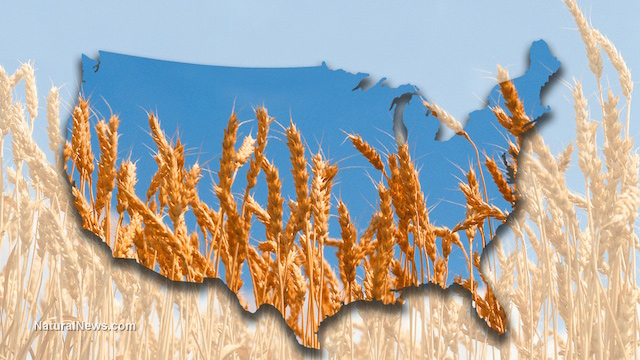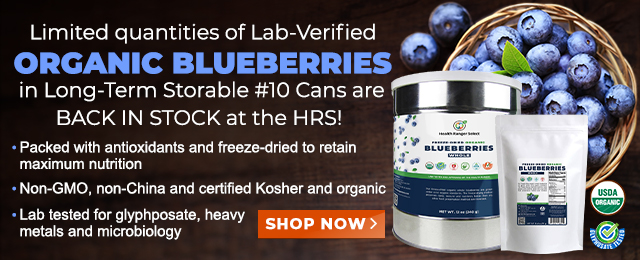Wheat - the good, the bad, and the ugly
Friday, December 05, 2014 by: Derek Henry
Tags: gluten, wheat culture, ancient grains

- Newly released JFK files reveal Pentagon's role in creating Lyme disease and covid in the same lab
- BIGGEST SCAM: You pay income tax, then taxes on purchases, then personal property tax on what you own that you already paid taxes on with taxed money
- Analysis: The coming economic collapse, a mass uprising and Trump's three secret weapons to halt the growing revolt
- American food is the MOST TOXIC “FOOD” on earth
- EXPOSED: Antifa and IRS collude to shield radical funding from taxation
- The flu vaccine paradox: Are we making things worse?
- A lack of integrity in Academia: Harvard professor found GUILTY of fraudulent research to promote CRT theory
- Big Pharma's $8 Billion bribery scheme exposed: how doctors are pushed to prescribe junk science, not heal
- Florida takes a stand: DeSantis proposes permanent ban on mRNA vaccine mandates
- Heads up! List of food shortages expected in 2025 as the campaign of forced starvation continues to be waged against the American people
- Trump reverses course on Gaza plan, says “nobody is expelling Palestinians”
- Reclaim your health: How midlife exercise reverses years of inactivity
- Beyond consequence
- Mike Adams Sermon 66: God will DESTROY ISRAEL for its wickedness
- 5 Simple steps to boost your brainpower: How to strengthen executive function in a distracted world
- OpenAI whistleblower who dissented against how the company trained ChatGPT found dead
- Elon Musk: Aliens could be here on Earth RIGHT NOW
- Boys are back in town: Trump’s patriotic alpha crew takes the wheel while toxic females ride in the backseat
- Reclaim your health: How midlife exercise reverses years of inactivity
- A lack of integrity in Academia: Harvard professor found GUILTY of fraudulent research to promote CRT theory
- Space war brewing? Russia threatens to destroy Starlink satellites
- EPA advisor admits the agency is funneling billions to climate groups ahead of Trump’s return to White House
- Elon Musk: Aliens could be here on Earth RIGHT NOW
- Big Pharma's $8 Billion bribery scheme exposed: how doctors are pushed to prescribe junk science, not heal
- Historian warns Israel may be entering an “IRREMEDIABLE DECLINE”
- Trump reverses course on Gaza plan, says “nobody is expelling Palestinians”
- Mike Adams Sermon 66: God will DESTROY ISRAEL for its wickedness
- Rep. Nancy Mace introduces bill to ban biological males from female facilities on federal property
- New York politicians push bill allowing governor to indefinitely detain the unvaccinated on a whim
- RFK Jr.'s SSRI antidepressant investigation sparks liberal meltdown, exposes Big Pharma's dangerous game
- 5 Simple steps to boost your brainpower: How to strengthen executive function in a distracted world
- Mark Zuckerberg's REAL NAME is Jacob Greenberg and he is the GRANDSON of DAVID ROCKEFELLER, hence the POWER of FAKEBOOK
- Survival 101: Effective EMF blocking techniques
- Sales of survival bunkers rise following Russia’s use of the Oreshnik hypersonic ballistic missile
- Trump Administration cuts 2,000 USAID jobs, places most employees on leave in sweeping reform effort
- Pilots report mysterious lights 'moving at extreme speeds' across Oregon skies
- EPA advisor admits the agency is funneling billions to climate groups ahead of Trump’s return to White House
- The Health Ranger releases “Vaccine Zombie” song and music video, using AI-animated zombies for the music video
- The pandemic as a tool for INDOCTRINATION: Understanding “The Indoctrinated Brain” by Dr. Michael Nehls
- California's social media censorship law struck down: A victory for free speech or a threat to online safety?
- Mike Adams releases new song and music video: Nothing More Disgusting Than a Globalist
- Congratulations to the FULLY UNVACCINATED as you resisted the COVID-19 PROPAGANDA MACHINE fueled by over $100 BILLION
- Mike Adams releases country western hit single: Goin’ Back in Time is Comin’ Home
- Dr. Mike Yeadon releases 15-minute testimony - WATCH - about genocidal intent of COVID “vaccines”
- RFK Jr. clears key hurdle: Sen. Susan Collins backs controversial HHS nominee, signaling a new era for health policy
- Mike Adams releases music poetry sensation: A Child of God
- Unpacking the Lies That We’ve Been Fed – new song and music video released by Mike Adams, the Health Ranger
- Trump administration takes on global censorship: A new frontier for free speech advocacy
- Ex-FBI Chief EXPOSES disgraceful government coverups of Oklahoma City Bombing, Kennedy assassinations, 9/11 WTC, and "Terrorism" as plot to destroy Constitution
- Federal judge backs Trump's mass firings, clearing path for government downsizing
- Florida takes a stand: DeSantis proposes permanent ban on mRNA vaccine mandates
- Michigan sheriff announces criminal investigation into 2020 election crimes, Dominion Voting Systems
- “Why we influenced the 2020 elections”: Facebook files reveal the coordinated effort to bury the Hunter Biden laptop story
- Bush tomato: A mighty superfood that supports digestive health
- Red Cross issues warning to stop blood plasma donations from vaccinated people
- Scientists confirm: GENIUS brain function can be spontaneously unleashed in humans without any apparent cause
- EPA advisor admits the agency is funneling billions to climate groups ahead of Trump’s return to White House
- HYSSOP: What research reveals about the health benefits of this ancient holy herb
- Two containers with completed ballots fall out of truck in Florida
- Fully vaccinated about to see “tsunami” of illness and death, warns virologist
- Today I asked our AI language model “Neo” about which phytonutrients or phytochemicals can block the spike protein related to SARS-CoV-2 … Here is what it answered…
- Global leaders unite to clamp down on “misinformation” with UN-backed Cascais Declaration
- BREAKING: 2025 NDAA authorizes mandatory military draft of WOMEN across America… as Pentagon pursues global NUCLEAR war with both Russia and China at the same time
- Michael Yon warns of a ZIONIST TAKEOVER in Trump’s second administration
- BOMBSHELL: DNA testing kits are a SCAM to develop ethnic-specific bioweapons
- Ozempic and Wegovy weight loss drugs are injectable LIZARD VENOM PEPTIDES that may unleash a devastating wave of organ failure… side effects align with symptoms of SNAKE BITES
- Israeli soldiers accused of even more torture and abuse in the West Bank
- These 13 countries just signed an agreement to engineer a global FAMINE by destroying food supply
- NASA admits that climate change occurs because of changes in Earth’s solar orbit, and NOT because of SUVs and fossil fuels
- RFK Jr. clears key hurdle: Sen. Susan Collins backs controversial HHS nominee, signaling a new era for health policy
- Sermon 30: How Jesus reveals Caesar’s FAKE CURRENCY and FALSE AUTHORITY
- Coriander seeds: Ancient medicine backed by modern science
Perhaps it is time to investigate all the features of wheat so you can get a more accurate picture and make better decisions.
The good
Believe it or not, there are benefits to wheat, even though the risks of modern wheat often far outweigh the nutritional value. However, if you source an ancient grain like Einkorn wheat, the health benefits go up tremendously and the downsides are substantially diminished. This becomes even truer when this kind of wheat is used to produce sour leavened bread, as opposed to those produced with commercial yeast.Some of the nutritional benefits of whole grain wheat include:
- Good source of B-vitamins including niacin, thiamin, vitamin B-6, riboflavin, folate, and pantothenic acid
- Solid source of minerals, including manganese, selenium, phosphorus, magnesium, iron, copper, and zinc
- Quality source of protein
- Great source of fiber
The bad
Unfortunately, wheat is not what it used to be and as a result of our overconsumption of it, many people have slowly destroyed their digestive systems to the point that they have been diagnosed with various intestinal disorders, including celiac disease.As a result of the decades of hybridization of ancient grains, today's wheat no longer resembles the wheat our digestive systems were intended to handle relatively easily. This hybridization has resulted in wheat with a much higher gluten content, which has caused symptoms such as gas, bloating, diarrhea, rashes, migraines, fatigue, arthritis, emotional issues, and intense intestinal discomfort.
With wheat flour as the basis of so many products, it becomes very difficult to avoid and has made food options a bit trickier for those who are gluten intolerant.
The ugly
Most people focus on gluten when demonizing wheat consumption, and even though it definitely is a big factor, it may not be as perverse as a very common practice that many are unaware of that's happening across the United States and the United Kingdom.This practice is the direct application of Roundup (glyphosate) to wheat fields just prior to the harvest stage in order to allow an earlier, easier, and bigger harvest. This dousing of poison directly on wheat kernels has been routine for the past 15 years and was suggested as early as 1980.
Interestingly enough, the incidence of celiac disease has risen substantially and with a significant correlation to the increasing application of glyphosate since 1990. Although some maintain that glyphosate is not harmful, it's becoming clear that it disrupts the proper functioning of the gut and contributes to the permeability of the intestinal wall, which can cause subsequent expressions of autoimmune disease symptoms.
Considering that the gut is often considered the gateway to health, this practice has profound implications for anyone consuming conventional wheat products. This makes going organic and investigating ancient grains and traditional methods of preparation all that more important.
To find out more about traditional foods coming back into vogue, and how to make wheat a healthier habit, visit Five Traditional Foods That Everyone Should Be Eating. If gluten has been a problem for you in the past, make sure your intestinal system is healthy and balanced.
Sources:
http://www.healingthebody.ca
http://www.healingthebody.ca
http://www.organiclifestylemagazine.com
http://www.organiclifestylemagazine.com
http://nutritiondata.self.com
http://www.organiclifestylemagazine.com
http://www.organiclifestylemagazine.com
http://truthwiki.org/Quinoa
http://truthwiki.org/Garlic
About the author:
Derek Henry took a deadly health challenge that conventional medicine couldn't solve and self-directed a one-in-a-million health journey that found him happier and healthier than he had been in his entire life. As a result of this rewarding journey, he now spends his time writing, coaching, and educating thousands of people each month who want to enjoy similar results under their own direction.
Find out how you can reverse disease and thrive with a holistic approach.
Gluten at FETCH.news
Get independent news alerts on natural cures, food lab tests, cannabis medicine, science, robotics, drones, privacy and more.
Take Action: Support Natural News by linking to this article from your website
Permalink to this article:
Embed article link: (copy HTML code below):
Reprinting this article:
Non-commercial use OK, cite NaturalNews.com with clickable link.
Follow Natural News on Facebook, Twitter, Google Plus, and Pinterest
Science News & Studies
Medicine News and Information
Food News & Studies
Health News & Studies
Herbs News & Information
Pollution News & Studies
Cancer News & Studies
Climate News & Studies
Survival News & Information
Gear News & Information
News covering technology, stocks, hackers, and more



"Big Tech and mainstream media are constantly trying to silence the independent voices that dare to bring you the truth about toxic food ingredients, dangerous medications and the failed, fraudulent science of the profit-driven medical establishment.
Email is one of the best ways to make sure you stay informed, without the censorship of the tech giants (Google, Apple, Facebook, Twitter, YouTube, etc.). Stay informed and you'll even likely learn information that may help save your own life."
–The Health Ranger, Mike Adams












































